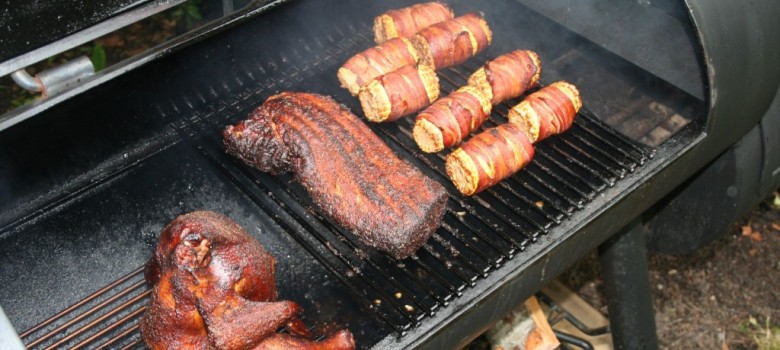
With the warmer weather now upon us, and BBQ’s being dusted off across the country, we at TheGreenAge thought it was a good time to talk about whether you can have a more sustainable green BBQ. BBQ’s actually can be very bad news for the environment, but as we shall see, it needn’t be that way!
 The Grill
The Grill
The fuel you use on the BBQ is important. There are a range of different options, from gas to wood to charcoal. Try to get your fuel from a sustainable source – charcoal or wood sourced this way will be much better for the environment. Bear in mind though that even sustainably sourced charcoal is likely to have been produced using the kiln method, which produces methane as a by-product. If you can, go for charcoal produced locally in the UK using the retort method. The best option of all is to use wood sourced locally – you can probably even find some for free. You could also try a briquette maker, which compacts old paper to usable logs for the fire.
When you are cooking, try not to use too much fuel. It is easy to put a whole bag of charcoal on the fire, but if you are only cooking for 4 people it won’t be needed. You can put the coals out by pouring water on them and then leaving them to dry – then you can reuse them next time you cook.
The Food
In case you didn’t know already, meat isn’t great for the environment. Creating any type of meat uses much more energy than vegetables and fruits, because of the extra link it creates in the food chain. Further, animals like cattle give off a lot of greenhouse gasses! If these sorts of things are of concern to you, but you don’t want to disappoint your guests by taking meat off the menu, then there are a few things you can do:
- Use locally sourced meat. Don’t use lamb from New Zealand when you can find a Welsh alternative. Your local butcher may be able to help.
- Try and add more vegetables into the mix. Instead of a dull looking salad on the side that nobody wants, be a little more inventive and include more veg on the grill itself. Even try some sustainably caught fish which can be cooked perfectly on the grill.
These are all ideals, but at the end of the day we know that it isn’t going to work for everybody – I for one love a steak! But at the very least try to cut down on waste!
There always seems to be waste at a BBQ – make sure you don’t cook too much! For drinks, try to buy in bulk. Larger containers mean less waste than individual cans and bottles.
Disposables
One of the big problems with BBQ’s is that everything is disposable with lots of plastic. From plates to cups to cutlery, there are usually bags and bags full of landfill waste at the end of the day. This needn’t be the case.
Recycling is also really important – there will be plenty of bottles and cans to be found in bin bags unless you take a few simple steps.
- If you can, use your normal plates to avoid disposables.
- Encourage people to reuse their disposable cups.
- If you need to use disposables – use biodegradable utensils.
- Have a clearly marked recycling bag so people know where to dispose of their cans and bottles.
Another big point on disposables is disposable bbq’s. In short, don’t use them; they just create more waste and tend to use cheap, unsustainable sources of charcoal.
Infrared Patio Heating
If your BBQ runs into the evening, people can start to feel a bit nippy and turn on the patio heaters. This is about the most wasteful way to keep warm there is, because nearly all the heat generated just goes straight up into the atmosphere. Of course, it may be tricky to convince everyone to just wear an extra layer – instead you can look at more efficient heating.
Infrared outdoor heaters work really well since you can direct the heat at people and it will heat them directly rather than heating the air, making them far more efficient than a standard convection heater.
Think we missed something? Do you have a different opinion?
Comment below to get your voice heard…












No Comments yet! Be the first one.